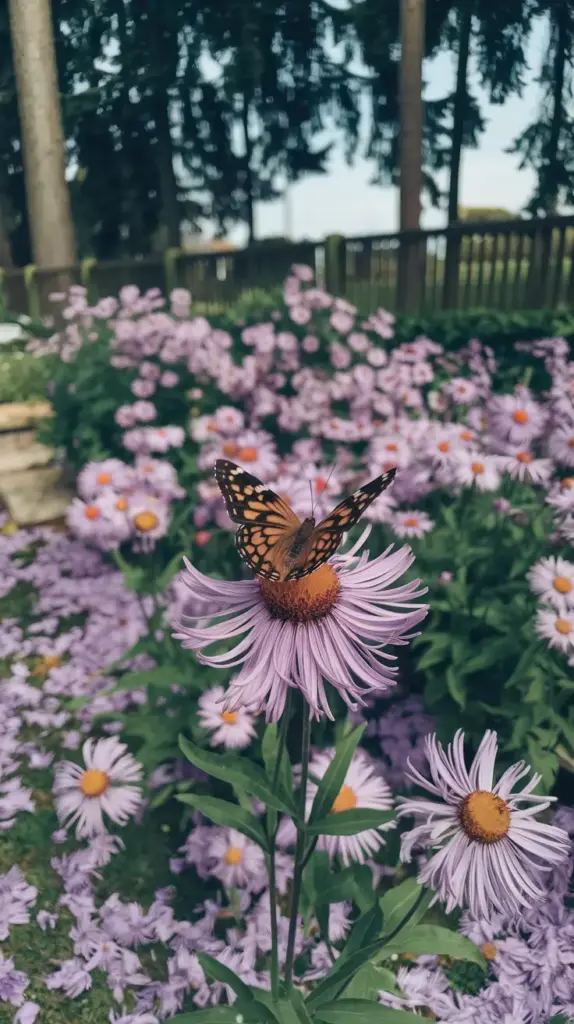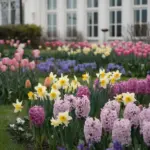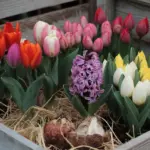10. Aster: A Late-Season Butterfly Magnet

Why Asters are Garden Gold
Let me tell you about my journey with asters – they’ve completely transformed my fall butterfly garden! When I first started gardening, I made the rookie mistake of only planting spring flowers. By August, my garden was pretty bare, and the butterflies had moved on to greener pastures. That’s when I discovered the magic of asters.
These spectacular late-season bloomers aren’t just pretty faces; they’re butterfly magnets that keep the show going well into autumn. I’ve watched countless Monarchs and Painted Ladies feast on my New England asters during their fall migration. It’s like having front-row seats to nature’s most amazing show!
Choosing the Right Aster Variety
Here’s something I learned the hard way – not all asters are created equal! The native varieties are absolute champions in the garden. In my Zone 6 garden, the New England aster (Symphyotrichum novae-angliae) and New York aster (Symphyotrichum novi-belgii) have been absolute workhorses.
These plants come in different sizes, which was a game-changer for my garden design:
- Dwarf varieties: 12-18 inches tall (perfect for borders)
- Medium height: 2-3 feet (great for middle ground)
- Tall varieties: 4-6 feet (amazing background plants)
Disease Resistance and Maintenance
One thing that makes me absolutely love asters is their natural disease resistance. Unlike some of my other plants that need constant babying, asters are pretty tough cookies. However, I’ve learned a few tricks to keep them even healthier:
- Space them properly: Give them at least 18 inches between plants for good air circulation
- Divide clumps every 3-4 years to prevent overcrowding
- Watch for powdery mildew in humid conditions (though native varieties resist this better)
Care Tips for Maximum Blooms
Want to know my secret for getting the most blooms? It’s all about the Chelsea chop! Around late May, I trim back about half of my aster stems by one-third. This creates a longer blooming season with some plants flowering earlier and others later. Talk about a garden hack that really works!
Here’s my tried-and-true care routine:
- Water deeply but infrequently to encourage deep roots
- Apply organic mulch in spring to retain moisture
- Pinch back stems before July to encourage bushier growth
- Deadhead spent blooms to promote more flowers
Companion Planting Success
I’ve found that asters play incredibly well with other fall bloomers. They look stunning paired with goldenrod, joe-pye weed, and sedum. Just imagine this combination: tall purple asters swaying behind golden yellow rudbeckia, with butterflies dancing between them. It’s pure garden magic!
Remember, asters prefer full sun and well-draining soil. I learned this the hard way after losing a few plants in my shade garden’s soggy corner. Now they’re thriving in my sunny butterfly border, and I couldn’t be happier with how they perform year after year.
The best part? These hardy perennials come back reliably each year, getting bigger and better. They’re truly the backbone of my late-season butterfly garden, providing essential nectar when many other plants have called it quits for the season.
Conclusion
Creating a butterfly-friendly garden isn’t just about adding beauty to your outdoor space – it’s about supporting these crucial pollinators! By incorporating these 10 spring flowers into your garden, you’ll create a sustainable haven for butterflies while enjoying a stunning display of colors and textures. Remember to avoid pesticides and provide water sources to make your garden even more inviting. Ready to start planting? Your butterfly paradise awaits!









GIPHY App Key not set. Please check settings